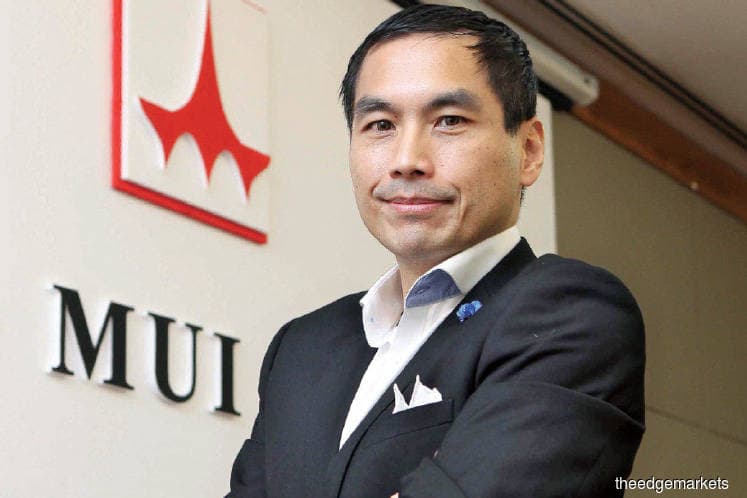
This article first appeared in The Edge Financial Daily on December 17, 2018
KUALA LUMPUR: Last Friday, the media got an introduction to the new executive chairman of conglomerate Malayan United Industries Bhd (MUI), Andrew Khoo Boo Yeow, who took over the role from his father Tan Sri Khoo Kay Peng as the latter went into retirement.
The 46-year-old Boo Yeow — the second oldest child of Kay Peng — is, however, no stranger to the group, having been holding the chief executive officer’s post since January this year.
MUI operates five businesses — retail (in which it owns 98.21% of Metrojaya Bhd and 35.17% of London-listed Laura Ashley Holdings plc); hotels (Corus Hotels and Laura Ashley hotels); food (Tango, Crispy, Tudor Gold and Kandos confectionery); property (Bandar Springhill); and, financial services (PM Securities Sdn Bhd and PCB Asset Management Sdn Bhd).
However, its earnings have not been impressive, with the group being in the red for the last four financial years.
Its net loss for the financial year ended June 30, 2018 (FY18) of RM56.08 million, however, narrowed by more than half of that reported in FY17, thanks to the disposal of three hotels.
These disposals are part of Boo Yeow’s three-year turnaround plan for the group.
“Under the plan, there are three strategic thrusts, with the first being corporate and capital restructuring. This is already under way, with another two years to go.
“It may mean things like [asking ourselves] how many listed companies do we want and how many dormant companies do we want to wind up.
“We want to rationalise our assets, (which) means that we are more focused in what we want to do, and the second part to that is we want to deleverage. We want to pare down our borrowings and that will make us stronger,” said Boo Yeow.
He said the third thrust will be the company’s business transformation.
“I want to transform the business to become more lifestyle-driven. We are doing that with our existing brands, but we are bringing in new brands such as Baker & Cook which is a lifestyle bakery; we will bring that into Metrojaya and to our Corus hotels too, hopefully.
“For Laura Ashley, we are working on a Laura Ashley spa and (opening) more Laura Ashley hotels (in the UK)... everything we do will have a lifestyle focus,” he said.
E-commerce plays an important part in transformation thrust
Part of MUI’s business transformation also entails incorporating e-commerce into its Metrojaya stores.
“For us, we are just starting the e-commerce journey. We recognise a need to go into e-commerce, but we have to do it the right way with the right partners. We have started to look at partners in the last few months.
“Yes, e-commerce is vital for our business because if we do not do it now we will be behind the curve. We cannot ignore it, but we want to do it properly,” said Boo Yeow.
Metrojaya currently has an e-commerce presence through third-party websites such as Lazada.
However, Boo Yeow is cognisant of the fact that MUI cannot just rely on that.
“We need our own platform, as well as social media and digital marketing. It’s a whole ecosystem. Laura Ashley is already doing it, and it is doing it well. E-commerce makes up 25% of its sales,” he said.
To investors, MUI is probably best known as the “asset-rich company” that boasts prime assets, such as Corus Hotel in London’s Hyde Park and Corus Hotel Kuala Lumpur.
Previously, the media-shy Kay Peng has been reported to have a “sentimental value” for certain MUI assets such as its prized London hotel, and that is no surprise given he has led the group for over 30 years.
However, Boo Yeow has a slightly different stance on the matter.
“My business approach is I like to be more objective, so I will have to look at what is best for the group. If it makes sense to sell, we will. But if it makes sense to build a particular business, we will do that too.
“Anything can be sold for a price if the right offer comes along, so we should not be too attached to assets,” he added.
On whether MUI could be a dividend-paying stock once it restructures its operations, Boo Yeow said it is the intention.
“That is the intention, because then we will be a more closely-followed stock. We want MUI to be [a] sustainable business and give back to our stakeholders, and a consistent dividend policy will be good.
“It depends on how fast we can turn around and transform the business, which we hope to do so in two years,” he said.
Year to date, MUI shares have declined by 30% to close at 16 sen last Friday, bringing a market capitalisation of RM469 million.